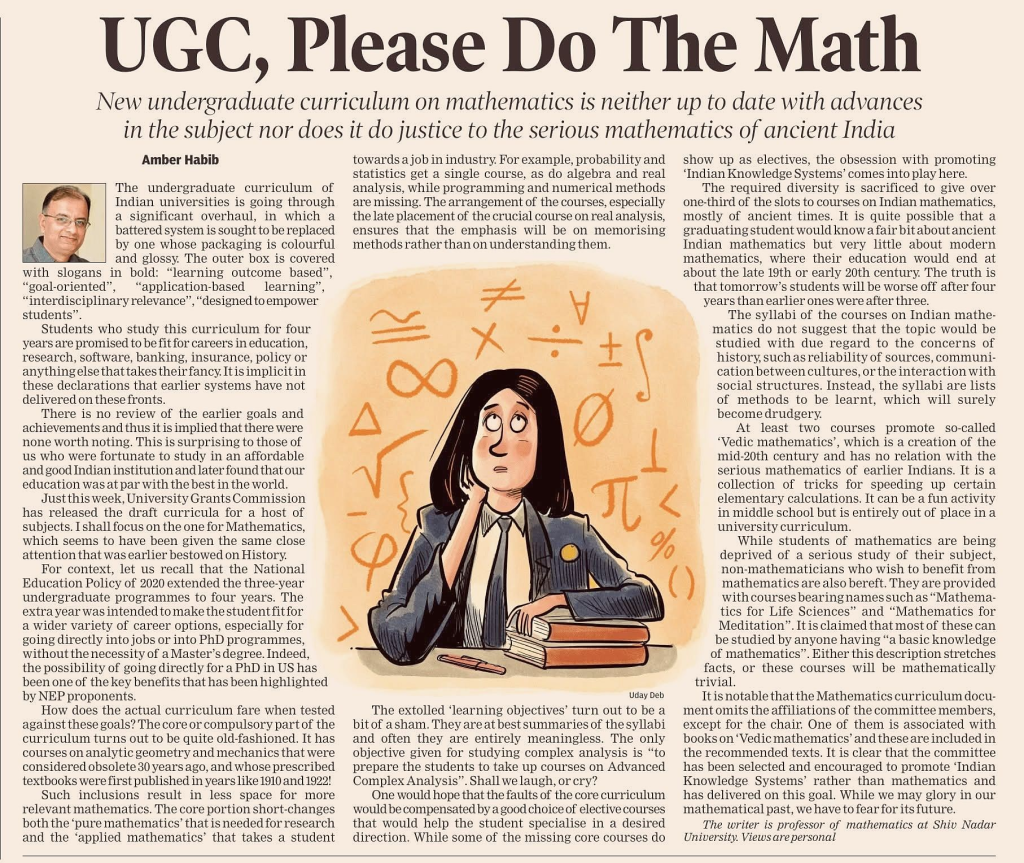The undergraduate curriculum of Indian universities is currently undergoing a substantial overhaul, in which a battered system is being replaced by a framework whose packaging is colourful and glossy. Its outer surface is emblazoned with bold slogans: ‘Learning Outcome Based,’ ‘Goal-Oriented,’ ‘Application-Based Learning,’ ‘Interdisciplinary Relevance,’ and ‘Designed to Empower Students.’
Students are promised that after four years, they will be equipped for careers in education, research, software, banking, insurance, policy, or any field of their choice. Implicitly, this suggests that previous educational structures were unsuccessful on these fronts.
There has been no review of past objectives or achievements, implying either that these goals were non-existent or insignificant. This is particularly surprising for those who studied at affordable and reputable Indian institutions, only to find their education was on par with the best in the world.
Recently, the University Grants Commission (UGC) released draft curricula for several subjects. Here, I will focus exclusively on mathematics, which has historically received less attention than subjects like history.
How UGC is destroying the field of mathematics in India?
- Shift from Pure to Applied Focus:
- Traditional mathematics education emphasized rigorous logical reasoning, proofs, and abstract thinking (pure mathematics).
- The new curriculum prioritizes applied mathematics, skill-based courses, and employability, which can dilute the depth and integrity of mathematical understanding.
- Neglect of Modern and Advanced Topics:
- Topics like real analysis, abstract algebra, and advanced probability receive less attention, while basic arithmetic tricks or superficial applied courses are highlighted.
- Students may graduate without mastering foundational concepts, which are crucial for research or higher-level mathematics.
- Misrepresentation of Indian Mathematical Heritage:
- Courses labeled as “Indian Knowledge Systems” or “Vedic Mathematics” are included in a way that appears more cultural than mathematical.
- This may give students a false sense of mathematical progress, while real historical achievements and modern mathematics are sidelined.
- Employment-Driven Agenda:
- The curriculum seems designed to produce job-ready graduates, not mathematically literate thinkers.
- Mathematics becomes a tool for industry, rather than a subject of exploration, creativity, and rigorous logic.
In short, The fear is that by prioritizing application and employability over theory and depth, the UGC is eroding the essence of mathematics as a discipline, which could have long-term effects on research, innovation, and intellectual growth.

The new undergraduate curriculum of Maths in India, guided by the National Education Policy (NEP) 2020 and UGC recommendations, is designed with an emphasis on employability and applied skills.
- NEP 2020 Recommendations:
- NEP explicitly recommends four-year undergraduate programs with flexibility for career-oriented courses and interdisciplinary learning.
- It encourages “Applied and Experiential Learning” to prepare students for jobs and higher education, rather than focusing purely on theoretical foundations.
- UGC Draft Curriculum (2023–2024) for Mathematics:
- Core courses still include some classical topics, but there is a shift toward applied courses, such as:
- Mathematics for Life Sciences
- Data Science / Statistics / Probability
- Mathematical Modeling
- Optional “Indian Knowledge Systems” or Vedic Mathematics modules are included, but these are ancillary and not part of the rigorous pure mathematics core.
- Core courses still include some classical topics, but there is a shift toward applied courses, such as:
- Official statements from UGC:
- The UGC press release on the new curriculum states that it is “designed to empower students with employable skills” and stresses outcome-based education, skill-based learning, and industry relevance.
Conclusion:
These points show that the government and UGC explicitly want students to gain applied mathematical skills to meet job market demands, rather than focusing primarily on pure mathematics or deep theoretical study.

